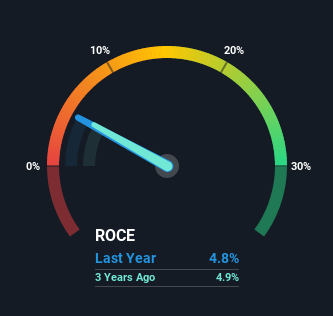- United States
- /
- Electric Utilities
- /
- NasdaqGS:LNT
Returns On Capital At Alliant Energy (NASDAQ:LNT) Have Stalled

Did you know there are some financial metrics that can provide clues of a potential multi-bagger? Ideally, a business will show two trends; firstly a growing return on capital employed (ROCE) and secondly, an increasing amount of capital employed. Basically this means that a company has profitable initiatives that it can continue to reinvest in, which is a trait of a compounding machine. Although, when we looked at Alliant Energy (NASDAQ:LNT), it didn't seem to tick all of these boxes.
Understanding Return On Capital Employed (ROCE)
For those who don't know, ROCE is a measure of a company's yearly pre-tax profit (its return), relative to the capital employed in the business. Analysts use this formula to calculate it for Alliant Energy:
Return on Capital Employed = Earnings Before Interest and Tax (EBIT) ÷ (Total Assets - Current Liabilities)
0.048 = US$786m ÷ (US$19b - US$2.1b) (Based on the trailing twelve months to December 2021).
Therefore, Alliant Energy has an ROCE of 4.8%. On its own that's a low return on capital but it's in line with the industry's average returns of 4.6%.
Check out our latest analysis for Alliant Energy

Above you can see how the current ROCE for Alliant Energy compares to its prior returns on capital, but there's only so much you can tell from the past. If you'd like to see what analysts are forecasting going forward, you should check out our free report for Alliant Energy.
The Trend Of ROCE
There are better returns on capital out there than what we're seeing at Alliant Energy. Over the past five years, ROCE has remained relatively flat at around 4.8% and the business has deployed 35% more capital into its operations. Given the company has increased the amount of capital employed, it appears the investments that have been made simply don't provide a high return on capital.
The Bottom Line On Alliant Energy's ROCE
In conclusion, Alliant Energy has been investing more capital into the business, but returns on that capital haven't increased. Although the market must be expecting these trends to improve because the stock has gained 77% over the last five years. Ultimately, if the underlying trends persist, we wouldn't hold our breath on it being a multi-bagger going forward.
If you want to know some of the risks facing Alliant Energy we've found 3 warning signs (1 is a bit unpleasant!) that you should be aware of before investing here.
If you want to search for solid companies with great earnings, check out this free list of companies with good balance sheets and impressive returns on equity.
New: Manage All Your Stock Portfolios in One Place
We've created the ultimate portfolio companion for stock investors, and it's free.
• Connect an unlimited number of Portfolios and see your total in one currency
• Be alerted to new Warning Signs or Risks via email or mobile
• Track the Fair Value of your stocks
Have feedback on this article? Concerned about the content? Get in touch with us directly. Alternatively, email editorial-team (at) simplywallst.com.
This article by Simply Wall St is general in nature. We provide commentary based on historical data and analyst forecasts only using an unbiased methodology and our articles are not intended to be financial advice. It does not constitute a recommendation to buy or sell any stock, and does not take account of your objectives, or your financial situation. We aim to bring you long-term focused analysis driven by fundamental data. Note that our analysis may not factor in the latest price-sensitive company announcements or qualitative material. Simply Wall St has no position in any stocks mentioned.
About NasdaqGS:LNT
Alliant Energy
Operates as a utility holding company that provides regulated electric and natural gas services in the United States.
Proven track record average dividend payer.
Similar Companies
Market Insights
Community Narratives



